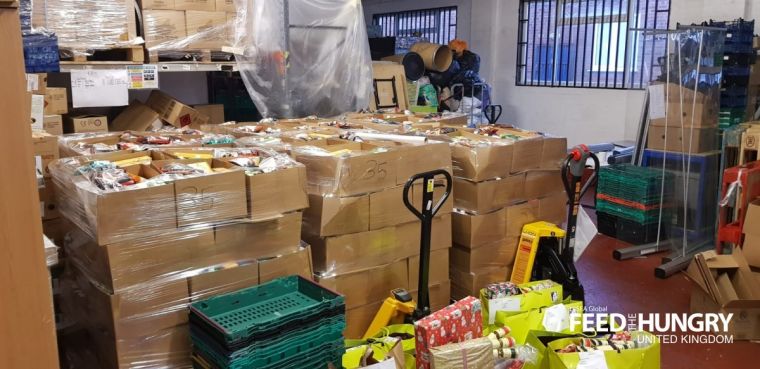Why food poverty and hunger need to remain a priority as the pandemic rumbles on

The latest lockdown quickly dashed our new year hopes. In Boris Johnson's address last week, the Prime Minister warned that the coming weeks would be the "hardest yet". Cases are surging and patient numbers rising as a "new more infectious variant" of the virus spreads across the UK.
And whilst there is light at the end of the tunnel, the new measures in England will last until at least the middle of February.
According to the PM, "we are entering the last phase of the struggle". But for many the struggle is far from over.
I have seen countries that were once the bread baskets of continents become desert places; communities reduced to slums by earthquakes; idyllic islands washed away by environmental changes.
I have seen people eating clay to stop hunger pangs; villages reduced to consuming grass. I have seen a grandmother walking 10km to look for food for her grandchildren, and holding a child of five years weighing no more that a newborn baby.
What I had not expected to see was children in my own neighbourhood here in the UK with clothes hanging off them, smiling because they had an orange in their food hamper.
Some of you reading this may be able to glimpse life beyond Covid-19, but there are people in our communities and across our nation who are struggling to see beyond the empty kitchen cupboard. Food poverty has become synonymous with this pandemic.
Among all the different noises in the news - from Brexit, vaccines and hospital beds - all relevant points to boot - despite Marcus Rashford's best efforts, hunger often falls down the list of priorities.
According to a statement from BAPEN in July 2020: "The media reported the number of children admitted to hospital with malnutrition was almost 2,500 in the first six months of 2020, double the number over the same period last year."
Nor did I think I would see these words written in the annals of Britain: "Unicef has defended its decision to fund emergency food aid in the UK for the first time in its history...The charity said that it was responding to an 'unprecedented crisis' in child hunger in the UK."
There is no doubt that hunger is not just a crisis abroad.

In the OECD's 2020 Ministerial Council Statement, entitled 'A Strong Resilient, Inclusive and sustainable recovery from COVID-19', they write: "All countries have been affected by the COVID-19 pandemic, and...our countries are... laying the foundations for a strong, resilient, inclusive and sustainable recovery."
"We will make every effort to...promote a recovery that does not leave the most vulnerable behind. We recognise the importance of working in cooperation with social partners in the recovery."
It is at a local level that people are hurting and going hungry. We don't have to look far beyond our own streets. Social groups are at the forefront of providing support to the most vulnerable individuals and families during this crisis.
As an organisation we have been working very closely with national and local government departments and agencies to provide families with food security through 2020.
We are now, though, at a critical point in this fight against Covid. We must continue to help communities have the provisions they need in place, and support them to be resilient through these critical few weeks.
'The Church in Lockdown' report highlights the role of the Church in this:
"Church efforts over the past few months have often focussed on the most urgent need for food. In April, demand from the 425 local food banks supported by the Trussell Trust and the Independent Food Aid Network doubled, with an average of 700 emergency food parcels provided by each provider in the month. From the figures available to us, we estimate that churches have been providing more than 5 million meals per month to those in need. The true number may be considerably more."
Food security is a vital step for recovery. This journey is about developing strategies that enable people to move from being in survival mode to a place of safety and sustenance, self-sustainability and significance. We are most effective in achieving this when the local church acts together in unity. This is not simply about feeding programmes, but a holistic approach to support, with feeding programmes at the centre.
Food is the most basic human need. In dispelling people's fear about where their next meal is coming from, we can allow them to consider their future, to journey on beyond their current situation. We give them hope. These resources act as a catalyst for locally-based projects - projects that build bridges into the community and enable people to be set free from poverty.
Gwyn Williams is Operations Director for Feed the Hungry UK.











